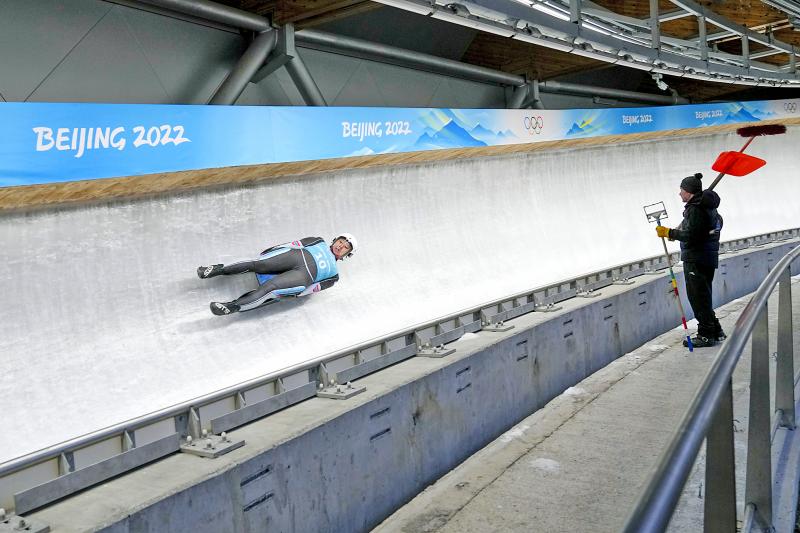An incident involving a Dutch reporter in the middle of a live broadcast who was dragged away by Chinese security officials was an isolated event and would not affect foreign media’s reporting at the Beijing Games, the International Olympic Committee (IOC) said yesterday.
The journalist, Sjoerd den Daas, was delivering his live report to public broadcaster NOS on Friday evening during the Games’ opening ceremony in the Chinese capital when several security officials surrounded him and one of them forcefully dragged him away.
Another security officer attempted to hold his hand in front of the camera as the reporter tried to continue speaking.

Photo: AP
The broadcaster had to interrupt the link with the reporter, leaving the studio anchor in the Netherlands confused.
“Obviously we have been in touch with the NOS, the state broadcaster, and it was an unfortunate circumstance,” IOC spokesman Mark Adams said. “I think someone was being overzealous. He [the reporter] was able to, very quickly afterward with the help of officials there, do his piece to camera.”
Games participants, including media, are restricted to a “closed loop,” which includes the venues, the media center and accommodations.
All participants must remain in that loop for the entire duration of the Games as part of China’s measures to minimize the risk of any COVID-19 spread during the Games until Feb. 20.
There have been concerns over whether visiting media would be allowed to freely do their job in China during the Olympics.
However, the IOC has repeatedly assured them that the contract signed with the Chinese hosts would allow every participant, including athletes and media, to speak freely within the loop.
“These things do happen, and I think it’s a one-off. I hope it’s a one-off, and we will assure you that within the closed loop you will be able to carry on your work,” Adams said.

CHAOS: Iranians took to the streets playing celebratory music after reports of Khamenei’s death on Saturday, while mourners also gathered in Tehran yesterday Iranian Supreme Leader Ayatollah Ali Khamenei was killed in a major attack on Iran launched by Israel and the US, throwing the future of the Islamic republic into doubt and raising the risk of regional instability. Iranian state television and the state-run IRNA news agency announced the 86-year-old’s death early yesterday. US President Donald Trump said it gave Iranians their “greatest chance” to “take back” their country. The announcements came after a joint US and Israeli aerial bombardment that targeted Iranian military and governmental sites. Trump said the “heavy and pinpoint bombing” would continue through the week or as long

TRUST: The KMT said it respected the US’ timing and considerations, and hoped it would continue to honor its commitments to helping Taiwan bolster its defenses and deterrence US President Donald Trump is delaying a multibillion-dollar arms sale to Taiwan to ensure his visit to Beijing is successful, a New York Times report said. The weapons sales package has stalled in the US Department of State, the report said, citing US officials it did not identify. The White House has told agencies not to push forward ahead of Trump’s meeting with Chinese President Xi Jinping (習近平), it said. The two last month held a phone call to discuss trade and geopolitical flashpoints ahead of the summit. Xi raised the Taiwan issue and urged the US to handle arms sales to

BIG SPENDERS: Foreign investors bought the most Taiwan equities since 2005, signaling confidence that an AI boom would continue to benefit chipmakers Taiwan Semiconductor Manufacturing Co’s (TSMC, 台積電) market capitalization swelled to US$2 trillion for the first time following a 4.25 percent rally in its American depositary receipts (ADR) overnight, putting the world’s biggest contract chipmaker sixth on the list of the world’s biggest companies by market capitalization, just behind Amazon.com Inc. The site CompaniesMarketcap.com ranked TSMC ahead of Saudi Aramco and Meta Platforms Inc. The Taiwanese company’s ADRs on Tuesday surged to US$385.75 on the New York Stock Exchange, as strong demand for artificial intelligence (AI) applications led to chip supply constraints and boost revenue growth to record-breaking levels. Each TSMC ADR represents

Pro-democracy media tycoon Jimmy Lai’s (黎智英) fraud conviction and prison sentence were yesterday overturned by a Hong Kong court, in a surprise legal decision that comes soon after Lai was jailed for 20 years on a separate national security charge. Judges Jeremy Poon (潘兆初), Anthea Pang (彭寶琴) and Derek Pang (彭偉昌) said in the judgement that they allowed the appeal from Lai, and another defendant in the case, to proceed, as a lower court judge had “erred.” “The Court of Appeal gave them leave to appeal against their conviction, allowed their appeals, quashed the convictions and set aside the sentences,” the judges